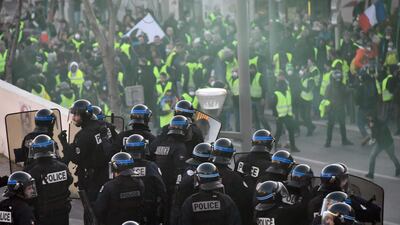After 10 weeks of violent unrest, the question is not just how flawed Emmanuel Macron has been in response to the gravest crisis of his presidency, but what has gone wrong with France?
The gilets jaunes protest movement has seen several people die and many more hurt, buildings set on fire, motorways blocked and businesses and jobs threatened.
In part at least, it presents an ugly caricature of a nation defiantly proud of its historically rebellious streak. When the original cause, the rocketing cost of fuel, was rendered academic by falling prices at the pump and the withdrawal of a proposed new green tax, attention merely shifted to other issues.
The contentious suppression of a wealth tax became a key focus, along with the lowering of the speed limit on secondary roads from 90kph to 80kph, falling living standards and, crucially, the president himself.
It is difficult to reconcile the faith invested in Mr Macron, when the centrist upstart exploited disarray in the major parties to rout the far-right leader Marine Le Pen in May 2017, with the despair that now engulfs his presidency.
What seemed a breath of fresh air back then has been overwhelmed by the stale stench of political failure in which the “president for the rich” jibe clings to him like a leech.
There is undoubtedly a case for arguing that the extremism of some gilets jaunes – named after their chosen dress code, the luminous yellow vests motorists are required by law to carry in their vehicles – reveals traces of a country descending into moral degeneracy.
From trashing the Arc de Triomphe and vandalising speed cameras and motorway toll booths, to thuggish attacks on journalists covering their protests, demonstrators have hardly covered themselves in glory.
It is tempting to ask in which other civilised state would so many people enthusiastically hail a former boxing champion caught on film making brutal attacks, with fists and feet, on police officers. Or where, less than two years after ostensibly voting for the reformist programme to which 40-year-old Mr Macron is committed, a clear majority – 67 per cent in one recent poll by the television station BFMTV – favour the gilets jaunes, despite shaming scenes of violence and destruction.
Immediate responsibility for such acts rests with far left, far right and anarchist elements and the hoodlums who flock to any French demonstration.
But outwardly respectable people, who might well reject any notion of extremism, show sneaking regard for the disorder that accompanies each mass turn-out. “My granddaughter insists les casseurs [rioters] are for us,” said a 96-year-old French woman, my wife’s aunt, without obvious disapproval. The rationale that the gilets jaunes would be forgotten if they merely protested peacefully is contagious. “You cannot make an omelette without breaking eggs,” said one man who sides with protesters.
An interesting distinction appears on closer inspection of the 67 per cent expressing similar sentiments. Some 36 per cent “supported” the movement, perhaps suggesting an uncritical view of violence, while 31 per cent “sympathised”, which could fall short of feeling the end justifies any means.
But sharing Mr Macron’s frequently declared abhorrence of the mayhem caused is not the same as hailing his response as measured, imaginative and fair.
As the principal target of protesters now demanding his resignation, the president acknowledges that the changes he considers essential for France’s future, along with economic pressures over which he has less direct control, have inflicted pain and aroused discontent.
He called for a "great debate" to thrash out the core issues. But he could not help himself launching it with words about France's "air of folly", a tendency always "to look for someone to blame …I have the impression I'm filling that role".
While accepting that part – villain of the piece or scapegoat for a longer-term malaise, according to outlook – he shows signs of being as out of touch with his people as was his hapless socialist predecessor Francois Hollande. When millions feel marginalised, unable to make ends meet and betrayed by politicians, their concerns cry out to be addressed seriously.
On a sensible view of the worst civil upheaval France has experienced since the 1968 revolt by students and workers, Mr Macron’s prime minister Edouard Philippe can hardly be faulted for seeking tough new measures to restore order.
Yet there is also evidence of individual acts of police brutality against protesters. Whatever pressures officers feel in the face of determined lawlessness, these must surely be investigated and, if necessary, punished as vigorously as the crimes of a minority of demonstrators.
A fascinating insight into the president’s thought process surfaced recently and will doubtless hearten those clamouring for his departure from the Elysee Palace. Days after his inauguration in 2017, Mr Macron reportedly confided in a political ally: "The situation [in France] is very difficult. If things go badly, I’ll end up even lower than Francois Hollande – if I complete my term of office.”
He was not exaggerating his uphill battle. Even as the gilets jaunes crisis began in November, his approval rating had slipped to 26 per cent, three points below that of Mr Hollande at the same stage of his presidency.
Little wonder that amid France‘s morale-boosting celebration of success in last year's World Cup, he observed: “It’s going too well. It could take a bad turn.”


